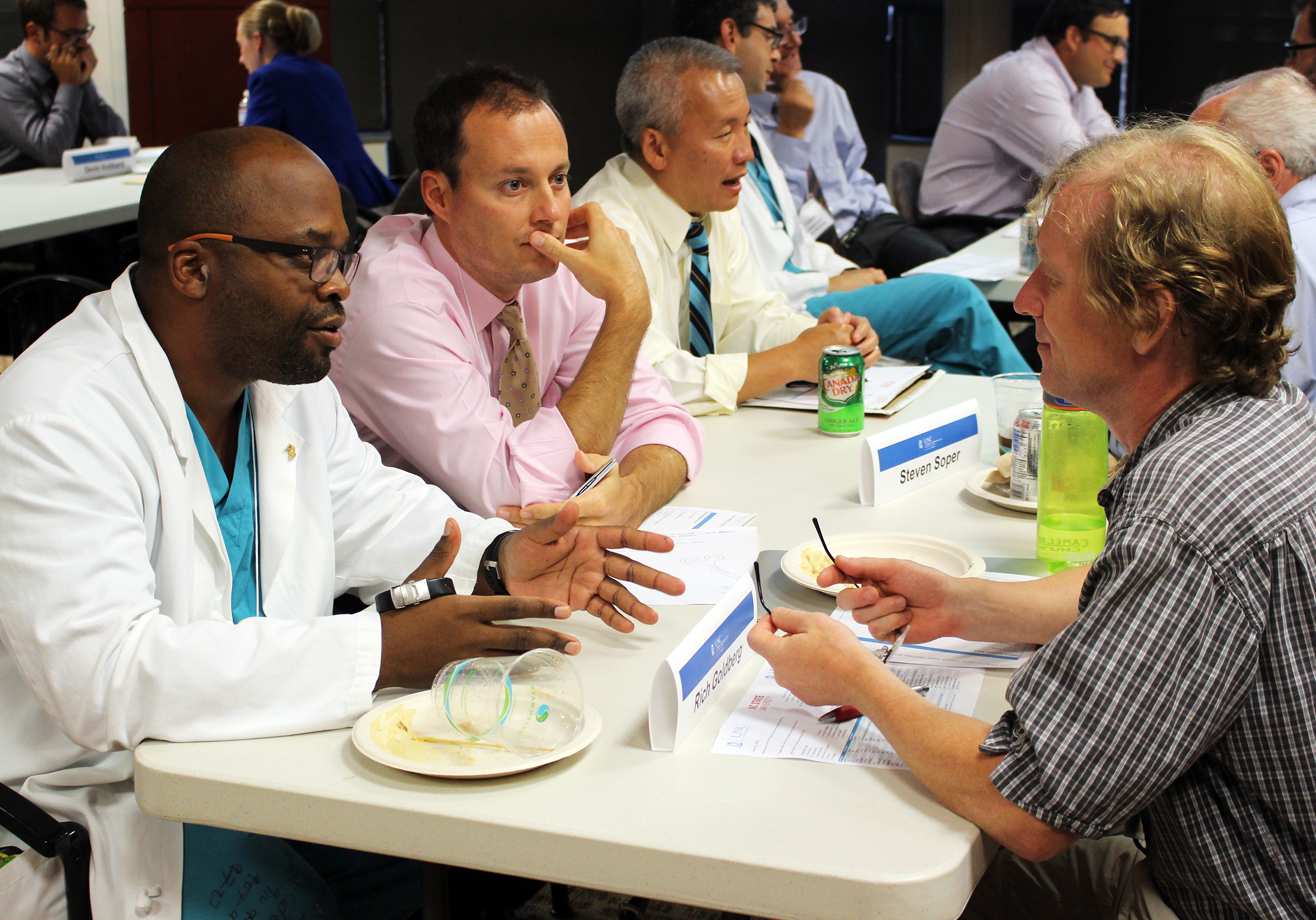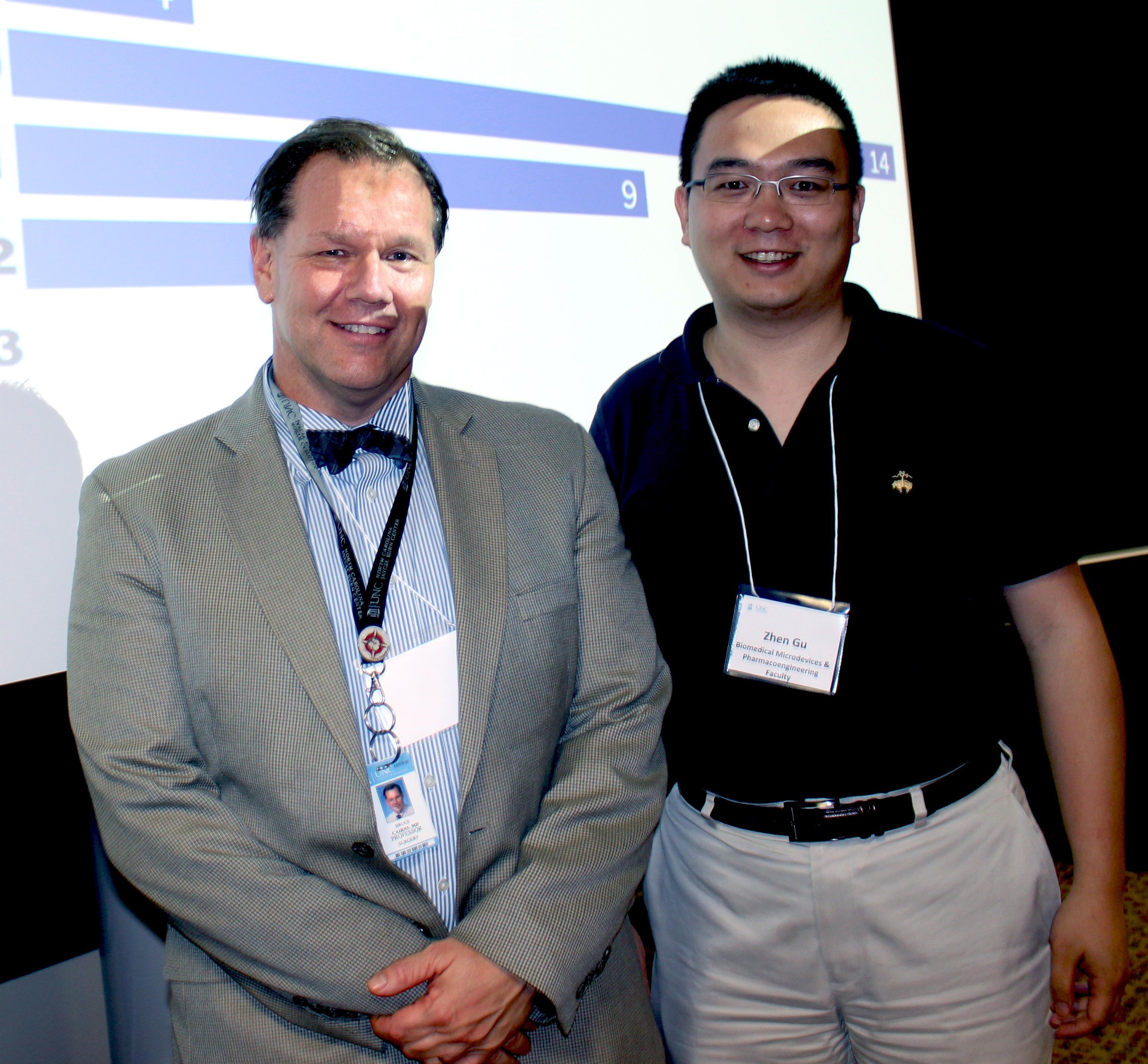The UNC Lineberger Comprehensive Cancer Center co-sponsored a speed-dating and pitch competition on June 29 to try to spark medical technology innovation. The top five teams that emerged from five-minute speed-dating sessions with pitches for new medical technologies won funding to help advance their ideas.


The UNC Lineberger Comprehensive Cancer Center played matchmaker recently, hosting a scientific “speed-dating” event to match surgeons with engineers based on mutual interests in solving real-world medical problems.
The cancer center co-sponsored the event on June 29 as an innovation-focused competition. The top five teams that emerged from five-minute speed-dating sessions with pitches for new medical technologies won funding to help advance their ideas.
“We want to solve real-world problems to improve people’s lives,” said Nancy Allbritton, MD, PhD, a professor and chair of the Joint UNC/NC State Department of Biomedical Engineering. “We want UNC to be known as the test bed site for new types of clinical tools and technology. We want to be the leaders.”
Teams came up with ideas for studying how colon cancer spreads in the blood, for studying radiation as a first-line treatment for sarcoma, and a potential new method for delivering pain medication to wounds. The competition was a cross-campus initiative of UNC Lineberger, the Joint UNC/NC State Department of Biomedical Engineering and University of North Carolina School of Medicine Department of Surgery. It was launched to encourage collaboration between UNC-Chapel Hill and North Carolina State University.
“We’re eager to see what comes out of this new initiative, and hopefully this will help build the spirit of collaboration between institutions,” said UNC Lineberger Director Norman Sharpless, MD, the Wellcome Distinguished Professor in Cancer Research.
UNC Lineberger contributed $40,000 to the competition thanks to the support of the University Cancer Research Fund, a fund created by the N.C. General Assembly for cancer research. The Joint UNC/NC State Department of Biomedical Engineering and UNC School of Medicine Department of Surgery also contributed additional funding.
“We really wanted to put some money behind this so people actually have an opportunity to jumpstart their ideas, rather than just bringing people together,” said Jen Jen Yeh, MD, an associate professor, the vice chair for research in the UNC School of Medicine Department of Surgery, a UNC Lineberger member and the event organizer. Yeh also holds an appointment in the UNC School of Medicine Pharmacology Department. She said she hopes to see the event continue into the future.
The top five teams determined by popular vote won funds. The team that won the top, $15,000 prize pitched the concept of a bandage that would release pain medication when stimulated by movement. The concept was pitched by Bruce Cairns, MD, director of the North Carolina Jaycee Burn Center and the John Stackhouse Distinguished Professor of Surgery at the UNC School of Medicine, and Zhen Gu, PhD, a professor in the Joint UNC/NC State Department of Biomedical Engineering. Gu also holds appointments in the UNC School of Medicine, UNC Eshelman School of Pharmacy and the UNC Diabetes Care Center.
“This idea is about being able to deliver a drug to the wound in a reliable way,” Cairns said of the bandage concept. “When a patient gets burned, if they’re laying still, it doesn’t always hurt. What we have proposed is a motion-activated drug release.”
Gu was co-senior author of a study published recently in the Proceedings of the National Academy of Sciences that detailed findings of research into a new, painless smart insulin patch. Their study found that the patch could lower blood glucose in a mouse model of type 1 diabetes for up to nine hours.
“This competition provides a great opportunity to bring people from different backgrounds and different expertise together,” Gu said of the speed-dating event. “It’s a great opportunity to generate something really unique – to fuse ideas together.”
The team that emerged as the winner of the second-place, $11,000 prize pitched using advanced PET-MRI imaging to study the response to pre-operative radiation treatments in patients undergoing surgery for high-grade, soft tissue sarcomas. The researchers’ goal is to develop a tool to measure tumor response to therapy, and potentially help guide treatment decisions to impact disease outcomes.
The third-place team won $8,000 to analyze colorectal cancer cells circulating in the blood in order to better understand the disease’s spread.
The fourth place team won $8,000 to study using a non-invasive ultrasound technique to determine the severity of a patient’s colorectal cancer. Knowing the severity, or stage, of the cancer is important to determine the type of treatment the patient will have to undergo, said Timothy S. Sadiq, MD, an assistant professor of surgery at the UNC School of Medicine.
The fifth place team won $10,000 to work on building a collaboration between N.C. State engineering students and UNC School of Medicine medical residents and faculty to use a UNC surgery simulation laboratory to develop ideas for innovative medical devices.
